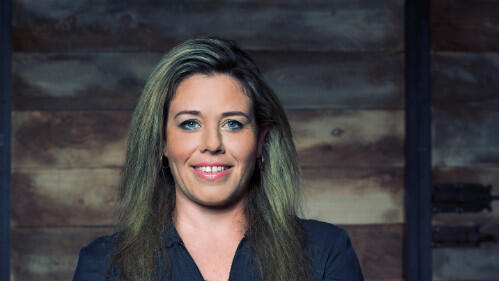
2024 VC Survey
2024 is the time for “cautious optimism”, says Firstime Ventures
The VC fund has joined CTech to discuss some of the ecosystem trends that investors can expect in 2024 and beyond.
“The challenges faced in 2023 undoubtedly posed significant hurdles for startups. However, 2023 provided a fertile ground for identifying emerging trends, investing in resilient and adaptive businesses, and laying the groundwork for future growth,” said Keren Kopilov, Partner at Firstime Ventures. “As we move into 2024, the key will be to leverage the lessons learned and remain agile in the face of uncertainty.”
Firstime Ventures invests in companies that build a sustainable and accessible future. It joined CTech for its 2024 VC Series to discuss some of the things the ecosystem can expect to see in the next few months.
“The outlook for 2024 is one of cautious optimism, with a focus on sectors poised for significant transformation and growth such as biotech and climate,” she added.
VC fund ID
Name of the fund: Firstime Ventures
Total assets: $250M
Leading partners: Jonathan Benartzi, Nir Tarlovsky, Itamar Weizman, Keren Kopilov
Latest investments in Israel: TripleW, BAIBYS Fertility, FeelBetter
Selected portfolio companies: Pixellot, Talkspace, SecuriThings, Matics, Clarifruit, Maverick, BeeHero, TripleW, BAIBYS Fertility, FeelBetter
From your perspective, was 2023 a ‘lost year’, or can the events that happened during it be seen as a springboard for opportunities in 2024?
The challenges faced in 2023 undoubtedly posed significant hurdles for startups. However, 2023 provided a fertile ground for identifying emerging trends, investing in resilient and adaptive businesses, and laying the groundwork for future growth. As we move into 2024, the key will be to leverage the lessons learned and remain agile in the face of uncertainty. The outlook for 2024 is one of cautious optimism, with a focus on sectors poised for significant transformation and growth such as biotech and climate.
What do you believe is more crucial to the state of Israeli tech: the influence of global processes and the global economy, or the local events ranging from the political protest to the war state?
The state of Israeli tech is significantly shaped by both global economic trends and local events, such as political unrest and security situations. While global factors provide the broader context, guiding investors towards viable business models and affecting companies’ valuations, local events have a more immediate impact on the sector and investor confidence. Although global dynamics are crucial for long-term growth, the direct effects of local issues can't be overlooked, as they directly affect the operational stability of many Israeli startups.
Has the prestige of Israeli high-tech been damaged, or are the protests and the war merely a 'small bump in the road' from which the sector can recover within months?
The prestige of Israeli high-tech is robust, supported by decades of innovation, entrepreneurship, and significant global contributions across various tech domains, and the resilience of Israeli startups is formidable. However, it’s too optimistic to expect a full recovery within months, given the uncertainty and complexity of the situation that has led to a noticeable decline in foreign investments. Recovery from current events will depend on the duration and severity of the situation, as well as on timely and effective support from the government for the industry.
How much effort was required of you to maintain the fund's status with your investors in 2023? What were their primary concerns and how did you address them?
Our efforts were consistently directed towards supporting our portfolio companies as they navigated the complexities of the market. We maintained transparency with our LPs, consistently sharing updates and insights about the evolving situation, addressing the concerns head-on, and reinforcing trust.
Related articles:
How are you preparing for the most pessimistic scenarios, such as the continuation of the war in Gaza deep into 2024, the opening of another front in the north, or further reduction of government support for high-tech?
Our approach has always been based on growing valid businesses that can cope with market volatility. We are working closely with our portfolio companies on their strategies and business plans to ensure a longer runway, and actively assisting them with different financing solutions.
Did you raise fund money in 2023 for an existing fund or a new one? What are your expectations regarding this matter for 2024?
Yes, we have raised money in 2023, continuing our focus on the climate sector, which is rapidly evolving. We expect that despite all the challenges faced by the industry, we will be able to raise additional funds given the critical nature of climate issues, the opportunities in this sector, and the increasing flow of global institutional money towards climate-focused investments.
How many investments did you make in 2023, and how does it compare to 2022?
During 2023 we led two equity rounds, and we supported our portfolio companies while exercising pre-emptive right and joining follow-on investments. This doesn’t differ too much from the previous year. The macroeconomic environment affected our investment processes - we took more time to learn and deepen at every opportunity, but beyond that, it did not harm our ability or motivation to make good investments in great companies.
In your view, will the amounts and/or the number of deals in 2024 be more like those of 2023 or 2021-22?
Anticipating 2024 to mirror the highs of 2021-2022 is overly optimistic… I hope that we will see a slight improvement in the latter half of the year, but such an outcome is dependent on several local factors that are currently unpredictable. It is better to prepare for the worst and hope for the best.
Which high-tech sectors will you focus on in the upcoming year? Which areas will maintain their prominence, and which ones appear less attractive?
We are focused on investing in sustainable companies addressing the climate crisis and global health challenges. These sectors are not only evolving but are also critically in need of viable solutions.
Which type of companies stand a better chance of garnering increased attention from VC funds this year - early-stage or advanced rounds?
The companies that will attract investors’ attention are the ones that solve major challenges and can prove viable business models in reasonable valuations. Early-stage companies that demonstrate strong potential for addressing global challenges will be attractive, and later-stage companies showing clear paths to profitability will attract VC funds seeking lower-risk opportunities.
What changes will you implement in your approach to evaluating investments in startups in the coming year, compared to the previous two years? What practices will you abandon, and what criteria will you now demand from founders?
Our strategy remains rooted in fostering resilient and viable businesses, so our core approach to evaluating new startups remains unchanged. The most important criterion is a clear, coherent business plan, that must be grounded in an understandable business model and go-to-market strategy, outlining the roadmap to profitability.
Do you think it is likely we will witness encouraging IPOs, the emergence of unicorns, or remarkable exits in 2024?
The current market dynamics are shaped by macroeconomic trends, global geopolitical events, and local circumstances. Internationally, despite fears of a recession in 2024, there are emerging signs of recovery. The Fed’s indication of lowering interest rates, albeit in a cautious manner, fosters careful optimism. I believe that the IPO window will re-open towards the second half of the year, as well as the landscape for M&As, but at lower valuation levels than seen in the previous years.
Provide an example of an intriguing investment you made in 2023. What sets this company apart, or what is distinctive about its sector?
The Circular economy is the key to emissions reductions.
TripleW converts 100% zero-cost food waste into pure Lactic Acid, a building block of PLA (polyplastic Acid, Bioplastic), and multiple industrial applications such as food and beverages, personal care, and industrial products. The solution is fully circular and the technology emerges a groundbreaking solution at the intersection of three significant sustainability trends: food waste recycling, reducing reliance on agriculture sources for non-food applications, and meeting the increasing demand for biodegradable plastics.
Practical and current tips for founders planning upcoming money-raising efforts:
- Craft a clear path to profitability: Build a coherent business plan that sets the path to achieve key financial milestones.
- Diversify funding sources: Broaden your fundraising strategy beyond traditional VC. Explore grants and credit lines that can mitigate the risk.
- Prioritize runway overvaluation: Secure as much capital as you can, and keep a reasonable burn rate.
Can you choose two portfolio startups you believe are poised for success in the coming year and explain why you think they deserve attention?
FeelBetter
Sector: Digital Health
Founded: 2018 by CEO Liat Primor and COO & CTO Yoram Hordan.
Investment amount: FeelBetter raised $5.9M in 2023, which brings the total raise to $8M.
Description:
FeelBetter optimizes medication management, addressing the complexities of polypharmacy, which is a growing epidemic among seniors, identifies at-risk patients, and prevents deterioration and hospital admissions.
The platform collects comprehensive patient data, performs a deep analysis of each patient's personal health journey, and leverages AI and ML to deliver "pharmaco-clinical intelligence" and make needed interventions.
Why is this their year:
FeelBetter, led by strong and experienced entrepreneurs, brings a new era in precision population health. After conducting a very successful study with Brigham and Women’s Hospital that demonstrated the company’s ability to improve patients’ health and financial outcomes, it has started commercial operations with U.S. clients.
With the healthcare sector moving inexorably towards value-based care, FeelBetter's technology and approach position it at the forefront of this trend, promising a year of opportunity and expansion in 2024.
BeeHero
Sector: Pollination
Founded: 2017 by CEO Omer Davidi, COO Itai Kanot, and COO Yuval Regev.
Investment amount: BeeHero raised over $60M.
Description:
BeeHero provides growers with a solution to maximize pollination by delivering an unprecedented scope of transparency into bee activity.
Pollination of most crops relies on bees, which are suffering high mortality rates. BeeHero addresses this challenge by installing sensors in hives and fields that collect audio and biological data and leverage proprietary AI and machine-learning analysis to provide crucial information for beekeepers and growers that improves yields and enhances bee health.
Why is this their year:
2024 could be a landmark year for BeeHero, as it embarks on a journey to redefine the future of pollination and agriculture. Having achieved a significant milestone with dozens of millions of ARR and managing hundreds of thousands of beehives, BeeHero is now setting its sights on an ambitious goal: to oversee 1 million hives. This will help them to become the largest pollinator in the sector, controlling a great valuable source of databases. This will not only enhance the efficiency and productivity of BeeHero's operations but also have the potential to revolutionize sustainable farming practices worldwide.
